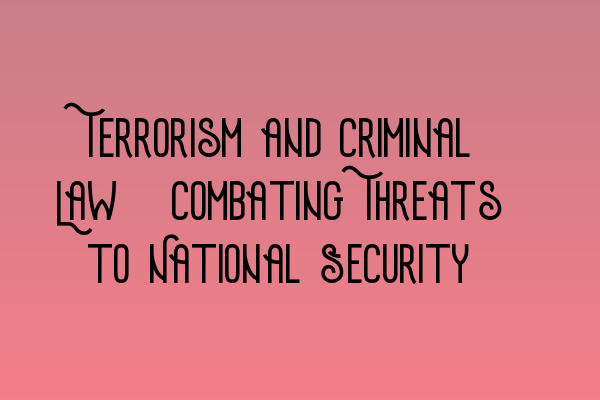Terrorism and Criminal Law: Combating Threats to National Security
In today’s society, terrorism poses a significant threat to national security. The ever-evolving methods and tactics employed by terrorist organizations require a robust legal framework to effectively combat these threats. Criminal law plays a crucial role in identifying, investigating, and prosecuting individuals involved in acts of terrorism. In this blog post, we will explore the intersection of terrorism and criminal law, discussing the challenges faced and the measures taken to safeguard our nation.
The Definition of Terrorism
Before delving into the legal aspects, it is important to understand what constitutes terrorism. Terrorism can be defined as the use of violence, intimidation, or coercion to achieve political, religious, or ideological goals. The motivations behind acts of terrorism are diverse and can range from attempting to influence government policies to inciting fear and panic among the general public.
Legally, the definition of terrorism varies from jurisdiction to jurisdiction. However, it generally encompasses acts such as bombings, hijackings, assassinations, and cyber-attacks that are intended to cause harm, destruction, or disruption on a large scale.
The Role of Criminal Law in Combating Terrorism
Criminal law provides the legal framework for identifying, investigating, and prosecuting individuals involved in acts of terrorism. It empowers law enforcement agencies to gather evidence, apprehend suspects, and present cases in court. Additionally, criminal law establishes the penalties and punishments for those convicted of terrorist offenses.
One of the key challenges in combating terrorism is the need to strike a balance between protecting national security and upholding civil liberties. Governments and legal systems must ensure that the rights and freedoms of individuals are safeguarded while taking appropriate measures to prevent and respond to terrorist acts. This delicate balance requires constant evaluation and revision of laws to adapt to the evolving nature of terrorist threats.
Terrorism and Criminal Justice Process
The criminal justice process plays a vital role in combating terrorism. It involves several stages, including investigation, arrest, trial, and sentencing. Each stage is meticulously designed to ensure a fair and just process while allowing for effective counterterrorism measures.
During the investigation stage, law enforcement agencies gather intelligence, collect evidence, and identify potential suspects. This process often involves cooperation between different agencies, both domestic and international, to gather as much information as possible to build a strong case.
Upon gathering sufficient evidence, law enforcement authorities make arrests and bring suspects before the courts for trial. The trial phase requires presenting evidence, cross-examination, and establishing guilt beyond a reasonable doubt. The judicial system must ensure that both the rights of the accused and the interests of national security are protected.
If convicted, individuals involved in acts of terrorism face severe penalties, including lengthy prison sentences. Sentencing laws vary depending on the jurisdiction, but they are designed to deter future acts of terrorism and to protect society at large. Some jurisdictions also have provisions for rehabilitation and deradicalization programs to address the root causes of terrorism.
Terrorism is not limited to physical acts of violence; it has also found its way into the digital realm. To effectively combat cyberterrorism, governments and law enforcement agencies must equip themselves with the latest technology and expertise. This includes the development of specialized cybercrime units, enhanced international cooperation, and robust legislation to prosecute those who seek to exploit the vulnerabilities of our interconnected world.
Conclusion
Terrorism presents a significant threat to national security, and combating it requires a comprehensive legal framework. By understanding the definition of terrorism, the role of criminal law, and the criminal justice process, we can better safeguard our society while upholding the principles of justice and fairness.
At SQE Criminal Law & Practice Law UK, we are committed to equipping aspiring legal professionals with the knowledge and skills needed to excel in the field of criminal law. Explore our SQE 1 Practice Exam Questions and SQE 1 Practice Mocks FLK1 FLK2 to enhance your understanding of criminal law principles. For comprehensive preparation, check out our SQE 2 Preparation Courses and SQE 1 Preparation Courses. Stay updated with the latest SRA SQE exam dates by visiting our SRA SQE Exam Dates page.
